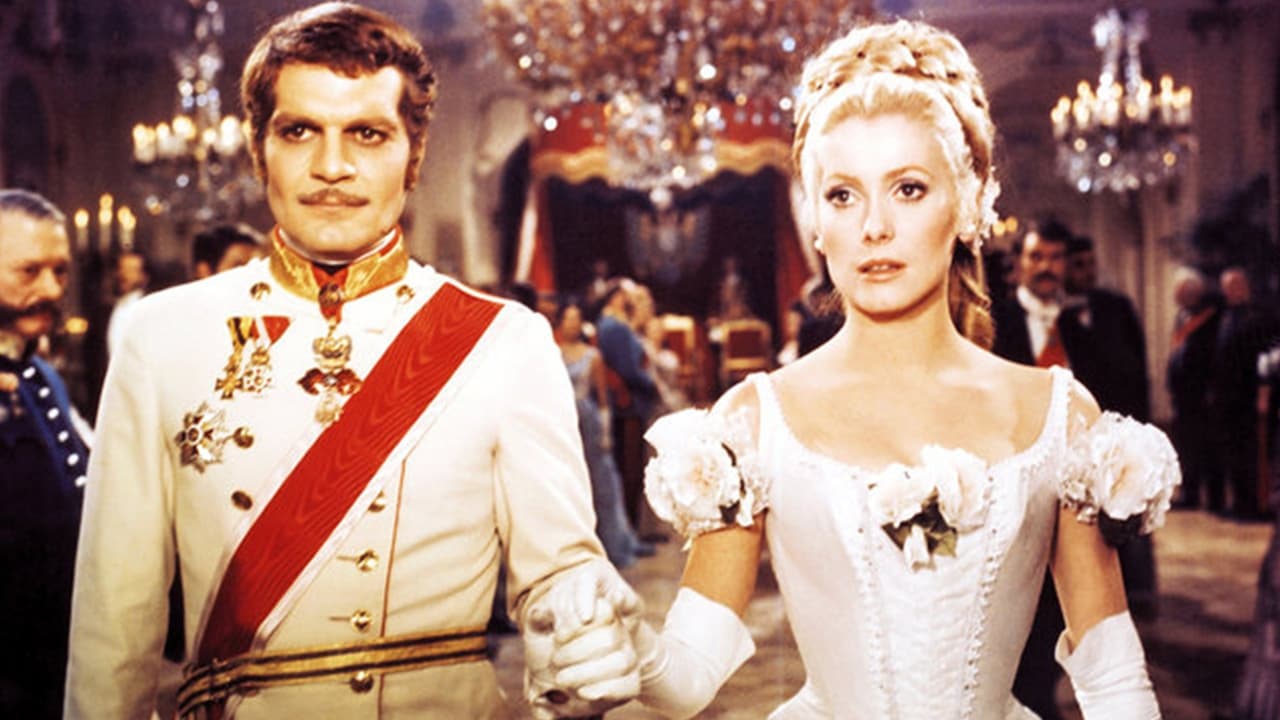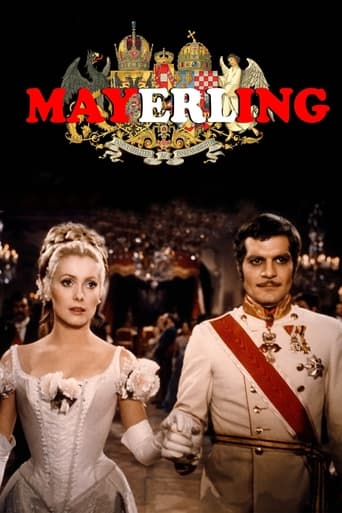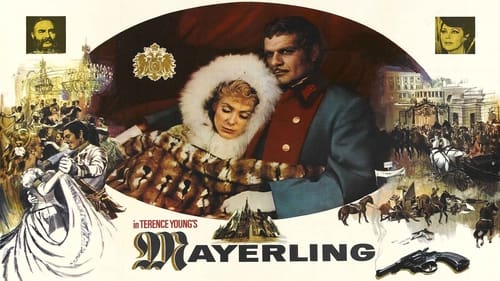Armand
the only sin about Mayerling is the expectation of viewer. because it is only a conventional romance. not profound, not convincing, only beautiful but that is just a detail. a film for fans of actors and for a lot of romanticism from public and solid information about empire situation for be ready to admire a sort of sketch about poor Rudolph and his bitter love story. Mayerling could not represent a real surprise; it is part from a wave who use history as vehicle for noble intentions, impressive budget, nice costumes and precise target who has always the nostalgia of fairy tales flavor. so, nothing special. because it is only a film about a subject from pink novels far by its roots or real signification.
dbdumonteil
All modern historians agree that it was not the "impossible " love depicted in all Mayerling versions.No Rudolph did not throw away his empire for the love of Mary!He had at the time of his affair with baroness Vetsera other mistresses(the most famous was Mizzi Kaspar).Too bad for those who are still dreaming of romantic passion,but the harsh truth is that Rudolph was a jaded man,using morphine to relieve his sufferings .He was seriously ill,since he contracted a VD.Historian Jean-Paul Bled goes as far as to say he would not have outlived his father anyway(think that his father died in 1916!).Just before his death he was not physically the handsome man played by Omar Shariff anymore!As for Mary,she was seventeen (Deneuve was already too old in spite of her stunning beauty),and she did love Prince Rudolph,but she was too young to understand that she was used by her lover as a helping hand to die:Rudolph had already asked Mizzi(see above) to die with him because he was frightened to pass away ALONE.Another scene is completely refuted by every earnest historian:during the ball in the German Embassy,Mary refuses to bow before Rudolph's wife Stephanie.Or ,absolutely nobody,among these who attended the reception,spokeabout it afterward.The only person who mentions it is Countess Marie Larish,who was not invited,and who was a very shady and perverse lady,who wrote a book called "my past" .And what a past!She was Empress Elisabeth's niece,child of a misalliance:Sissi's brother had married an actress.In the Mayerling saga ,she played a very bad part,that of a go-between(Genevieve Page in the movie)The imperial couple reunited James Mason and Ava Gardner ,who were the leads in "Pandora and the flying Dutchman" (Lewin,1951),a treat for cinema buffs.The cinematography is dazzling,and at least the story was filmed where it took place.Francis Lai's score is nice too(Un Homme Et Une Femme,1966,love story,1970).The director ,Terence Young ,is the movies odd-job man:James Bond (Dr No,From Russia with love,thunderball),the amorous adventures of Moll Flanders,wait until dark,the Christmas tree,spy thriller,horror,melodrama,not a genius but a competent craftsman.After Mayerling,the hunting lodge was razed to the ground and the emperor had a nunnery built on the site.Hence the necessity to film the last part in a studio.Another scene completely made up from start to finish is the Deneuve /Gardner meeting.At the time ,Elisabeth had become the wandering empress she would remain until her death in 1898,nine years after the Mayerling tragedy.She used to shun Vienna,the Court ,the étiquette and even politics.But the movie is true for one thing:she was here when Rudolph died.Marie Larish(Genevieve Page),the go-between, was her protégée,but she would realize too late what a perverse creature she was.Rudolph was a depressed man,who failed twice:politically,he was kept out of things by his father and his plots led to nowhere.He used to worry about the Monarchy's (actually a double one,Austrian and Hungarian since 1867)future and he dreamed of federalism and parliamentary democracy;besides,his marriage was on the rocks,his wife Stephanie(Andréa Parisy) being unable to give birth to another child. The opening scene is the only one which deals with politics:a student riot during which Rudolph is arrested by the police:once again,it's very implausible,since the Kronprinz's actions were watched day and night by Francis Joseph's henchmen.Even his numerous -and almost absent here ,to give the movie a romantic flavor-mistresses used to "help" police reports.The best thing-one user noticed it- is Marie Larish's obnoxious behavior.Genevieve Page is remarkable,acting with Mary Vetsera like a spider with a fly,unbeknown-st to her mother (Mony Dalmes).Outside Litvak's version ,already mentioned by some users,there's also Jean Delannoy's "le secret de Mayerling" (1949),with Jean Marais as Rudolph which has a rather good reputation,in spite of a weird ending:Bismarck was behind the lovers' assassination.Even stranger:when Zita,Austria's last empress ,came back from exile in the early eighties,she hinted at a political assassination as well.
jojofla
Although not up to the excellence of the classic 1936 film starring Charles Boyer and Danielle Darrieux, this remake of the tragic romance between Crown Prince Rudolph of Austria and commoner Maria Vetsera is still quite compelling. Omar Sharif is burdened with the worst haircut imaginable, yet when he looks longingly at lovely Catherine Deneuve, it should send your heart fluttering. And while Maria isn't as strongly written as the character should be, Deneuve projects innocent maturity beautifully. Ava Gardner and James Mason don't have much to do, but James Robertson Justice is a joy as Prince Edward of England. Extraordinary production values make it a visual delight. Finally, while the script fails to properly explain the political situation that would drive Rudolph to his drastic decision, director Terence Young builds the tension to heartbreaking pathos, with the final moments fully worthy of a great tearjerker.


